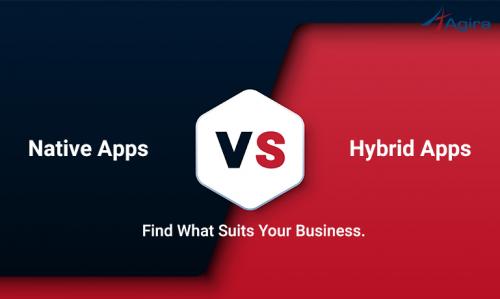Native Apps Vs Hybrid Apps. Find What Suits Your Business

Mobile application development has drastically changed the world in many different ways. They made many things easier and transformed many different industries. For businesses, it is a breakthrough to reach with their customers more personally as brands.
A business report by IOL states that by 2020 mobile apps will generate $188.9 billion through subscriptions and in-app advertising.
One should necessarily don’t need to mention the benefits of mobile app development for an e-commerce business.
The market share of Android is 76.24% while iOS is 22.28% by September 2019, according to Statcounter. You can say that the rapid pace of mobile app development market is due to its flawless user experience, engaging user interface and many others.
Your business will definitely need an awesome app. There is absolutely no doubt in that. But there are two major app types from which you need to choose one. They are Native apps and Hybrid apps. Which one is the best for you? So, we are here to help you out with this.
What is a Native App?
A native application is a software program developed for a particular device or OS which has access to device-specific hardware and software. Being designed for customized devices, native apps render you an optimized performance by using the device’s technologies such as GPS, camera, and others.
Initially, the term “Native Apps” referred to personal computers, but now it predominantly represents mobile web apps. As you all know, two major mobile OS platforms are Android and iOS.
Pros of Native Apps
Optimized performance
Flexibility
Marketing and engagement is easier
Flawless match of UI with UX
Quality assurance
Cons of Native Apps
Does not work cross-platforms (multiple codebase required)
Eventually, leads to additional cost.
High time consumption
Native App Development Frameworks
For native apps, one needs to write code in the preliminarily used for the specific device and its OS. For instance, you need to write code in Swift for building iOS applications and create Android native apps using java.
What is a Hybrid App?
Hybrid apps are the software program written with HTML 5, CSS, and Javascript wrapped in native contain. You can also call a Hybrid app as a native app that can be downloaded from the play store or the AppStore. But It is up to the user to give access to certain features of their device to that app. Yet one cannot complain about the performance of the app.
Pros of Hybrid app
Single code base for all platforms (cross-platform).
Hybrid apps can run in browsers like any web apps.
Flexibility, and access to the internal features of the device.
Enhanced performance despite of any device or browser.
Cons of Hybrid Apps
Slower than native apps (in case of heavy graphics)
Dependant on a 3rd party platform to deploy app’s wrapper.
Expensive customizations
Hybrid app development frameworks
Cordova
Ionic
Framework7
Titanium Appcelerator
Onsen UI
Xamarin (based on C#)
Native vs Hybrid
| FUNCTION | Native Apps | Hybrid Apps |
|---|---|---|
| Cost-effective | - | Win |
| User experience | Win | - |
| Maintenance | Win | - |
| Complex features | Win | - |
| Quick to develop | - | Win |
1. Cost-effective
Native apps require the knowledge of different programming languages that work for different mobile OS. Meanwhile, the same code base is used for developing Hybrid apps that work on all platforms. Obviously, the development cost for Native apps is higher than hybrid apps. The code reusability is higher in the case of hybrid apps than with Native apps.
2. User experience
Native apps are created with the device’s dynamics, screen size, and hardware capabilities. Being optimized for the specific device, Native apps can undoubtedly give you a wonderful user experience than any other. So, one can endure the best user experience with Native apps. Hybrid apps do struggle to match that perfection.
3. Maintenance
It is easy to update or upgrade the Hybrid apps than native apps. Generally, deployment of native apps takes more time than hybrid apps.
4. Complex features
Native applications always wins when it comes to high-performance. As we know that it can easily access the built-in capabilities like GPS, camera, microphone, and many more. But, Hybrid apps have limited access and require plug-ins.
5. Quick to develop
As Hybrid apps use the same code base to work on all platforms, Hybrid apps are quick to develop compared to native apps. Native app development is more time consuming as different codes need to be developed for different platforms.
Regardless of what app you choose for your business, make sure that your app has the following qualities.
Ensure that the API is structured to showcase the content and enhance its ease of access.
Instead of replicating your website, build an API that extends your brand.
Understand your users before designing the user interface and experience. And adapt your design accordingly to the user behavior.
Now you are aware of the advantages and disadvantages of native apps as well as hybrid apps. It is up to you to decide which one is suitable for the goals of your business.
Not able to decide yet?
You can consult with the mobile application development experts here.
Post Your Ad Here
Comments